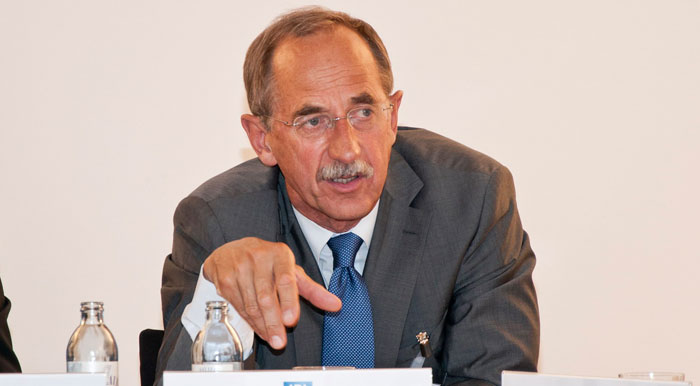
The world is changing at an unprecedented pace. It is hard enough to keep track of the events of the day, let alone to think about the challenges of tomorrow. But while it is not possible to predict the future, it is possible to prepare for it. Strategic forecasting enables policy makers to have a better sense of what may be over the horizon, and therefore be better equipped to prevent and response to events.
On June 20-21, IPI’s Vienna Office, with the support and cooperation of the Austrian Federal Ministry for Defence and Sports, brought together experts from the private sector, inter-governmental organizations, think-tanks, and the Austrian government to exchange views on strategic forecasting.
Participants discussed the methods and merits of strategic forecasting. It was noted that there is no perfect method for strategic forecasting – the research needs to determine the methodology. However, there are variables to consider such as: vulnerability, threats, resilience, actors, drivers, triggers, impact, and likelihood. Participants underlined the importance of framing the question of what should be the focus of the forecast, as well as identifying the needs of the target audience. Making inter-linkages between variables – “connecting the dots” – was also stressed.
The process of gathering and synthesizing information was discussed. It was noted that the pool of available information has deepened significantly in the past few years, especially due to social media and powerful search engines. Nevertheless, it was stressed that there is still no substitute for reliable human intelligence.
A number of participants highlighted that the very process of strategic analysis and forecasting can be as, or even more, important than the outcome. For example, it promotes information sharing, analysis, and more collaborative work flows that can reduce risk, increase adaptability and preparedness for any challenge. This can enable more flexible responses, even for unexpected events.
As part of the workshop, participants looked at, and provided feedback on, a case study of Central Asia. Among the issues looked at were demography, human development, the economy, natural resources, the environment, drugs, crime, and terrorism, the military, political structure, and regional cooperation as well as the inter-action of these factors.
The workshop discussed how scenario planning and gaming exercises can test different hypotheses and help to predict potential outcomes.
While strategic forecasting is interesting in and of itself, it really only becomes relevant when it feeds into the planning process. Participants therefore looked at how the outcomes of forecasting can be translated into policy, both within inter-governmental organizations (like the UN and the OSCE), and within governments (like Austria).
A key conclusion was that strategic forecasts should not only highlight problems: they should also identify possible solutions in order to reduce risk and vulnerability. Furthermore, they can be used to identify opportunities and not just threats.
The meeting was held under the Chatham House rule of non-attribution. Welcoming remarks were made by General Johann Pucher, Austrian Federal Ministry for Defence and Sports, and Walter Kemp, IPI Vienna.







